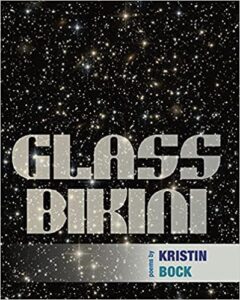
Kristin Bock
978-1946482556
2021, Tupelo Press
$16. 100 pages, paper
Reviewed by Michael Maiello
Kristin Bock’s Glass Bikini comprises a poetic cosmology where Jungian archetypes swirl through contemporary life and we witness uncanny valleys (where artificial realities seem so real that they inspire unease) of our own creation. “And it came to pass, art became extinct.” is the first line in the opening prose poem, “Overcome.” What follows is an exploration of how art refuses to stay dead. When we tamp down the spiritual, it hibernates, transforms and re-emerges. Our subconscious beliefs define reality as much as they are born from it.
The chapter “Into the Woods,” opens with a sharp and collection-defining prose poem called “Gaslighter.” A woman receives a beautiful, handmade handbag as a gift from a friend. She accepts it joyfully. But then finds that it fills itself with jewels that she knows she has stolen, but doesn’t remember stealing. Soon, the bag of jewels also contains parts of its owner’s body — at first her hand and then other pieces. Is her friend her friend? Has she lost herself to a gift, as so many people do in myths, fairy tales and life?
In a poem in the chapter “Wonderland”, Alice slips down a hole and finds herself engaged in a mixed martial arts fight with the President of the United States. The action is visceral and more violent than any sanctioned, televised fight. The president chokes and bites. There are no referees. A stadium of onlookers cries, “Eat or be eaten in Wonderland,” which reminds us that Lewis Carroll’s Wonderland and his space beyond the looking glass were both dangerous places where little girls might have adventures but might also find themselves capriciously beheaded. Such is life.
The author brings multidisciplinary skills to her poetry. She professionally restores liturgical art and also lectures in the Business Communications Program at the Isenberg School of Business at the University of Massachusetts, Amherst where she also earned her MFA in poetry. That she has expertise in corporate communications seems relevant as her style is rich but economical. Most of her poems are compact and prose-style, though she also has free form poems and multipage narratives. She makes judicious use of every word and image. She is equally comfortable in worlds of fancy and the brick and mortar of dollar stores, as she shows in a two person minicycle set in such a locale. This seems a benefit of practicing both corporate and creative writing as well as working in visual arts.
Her poems are theatrical and would read well before a live audience. Some of the first person pieces like “My Father’s Chiaroscuro” or the previously mentioned “Gaslighter” would be particularly effective on stage. An audience could have the imagery and feeling wash over them in less than a minute each. There are probably whole plays that could be written around those economic expressions. Bock cites English playwright Sarah Kane as an influence, which might add to the theatricality of her work. Kane and Bock do seem to share an affinity for literary expressionism.
Glass Bikini is Bock’s second book for Tupelo Press and her poems have been widely published in venues like Hobart, the now-shuttered Entropy and FENCE. The temptation is to imagine that each poem in this collection is a story told by a single narrator, though there’s room for the reader to imagine multiple perspectives. Of course, a multitude of perspectives doesn’t demand a cast of more than one. We all have many faces for the faces that we meet.
Taken together, Glass Bikini absorbs the reader like a dream does. Taken in pieces, each poem offers a singular perspective on the world, like looking through a telescope. The book ends with a longer coda — a poem as an extended diary of life on “The Looking-Glass Planet.” It ends with an image that recalls the end of “Gaslighter” and delightfully unifies the collection.
Published in Cider Press Review, Volume 24, Issue 3.
See all items about Michael Maiello
Visit Michael Maiello’s contributors page.
See all items about Kristen Bock
Visit Kristen Bock’s contributors page.


 Michael Maiello is a journalist, essayist, playwright and author who held editorial positions at Forbes for 10 years and has also written for The New York Times, Esquire, Rolling Stone, McSweeney’s, Reuters, The Daily Beast, Weekly Humorist, Splitsider, The Awl and more.
Michael Maiello is a journalist, essayist, playwright and author who held editorial positions at Forbes for 10 years and has also written for The New York Times, Esquire, Rolling Stone, McSweeney’s, Reuters, The Daily Beast, Weekly Humorist, Splitsider, The Awl and more. Kristin Bock holds an MFA in poetry from the University of Massachusetts, Amherst where she teaches in the Business Communication Program. Her first collection, Cloisters, won Tupelo Press’s First Book Award and the da Vinci Eye Award. Her poems have appeared in many journals, including The Black Warrior Review, Columbia, Crazyhorse, FENCE, Pleiades, Prairie Schooner, Salt Hill and VERSE. Bock is also a founding editor of the literary magazine Bateau, and a Massachusetts Cultural Council fellow. She lives with her husband, artist Geoffrey Kostecki, in Montague, Massachusetts and together they restore liturgical art.
Kristin Bock holds an MFA in poetry from the University of Massachusetts, Amherst where she teaches in the Business Communication Program. Her first collection, Cloisters, won Tupelo Press’s First Book Award and the da Vinci Eye Award. Her poems have appeared in many journals, including The Black Warrior Review, Columbia, Crazyhorse, FENCE, Pleiades, Prairie Schooner, Salt Hill and VERSE. Bock is also a founding editor of the literary magazine Bateau, and a Massachusetts Cultural Council fellow. She lives with her husband, artist Geoffrey Kostecki, in Montague, Massachusetts and together they restore liturgical art.


